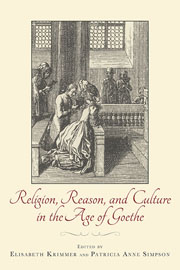Book contents
- Frontmatter
- Contents
- Acknowledgments
- Introduction
- I Wieland and Herder
- II Schiller and Goethe
- III Kleist and Hölderlin
- 6 Saint Mary's Two Bodies: Religion and Enlightenment in Kleist
- 7 Catholic Conversion and the End of Enlightenment in Religious and Literary Discourses
- 8 Sacred Maternity and Secular Sons: Hölderlin's Madonna as Muse
- IV Leibniz, Spinoza, and Their Legacy
- Notes on the Contributors
- Index
8 - Sacred Maternity and Secular Sons: Hölderlin's Madonna as Muse
from III - Kleist and Hölderlin
Published online by Cambridge University Press: 05 December 2013
- Frontmatter
- Contents
- Acknowledgments
- Introduction
- I Wieland and Herder
- II Schiller and Goethe
- III Kleist and Hölderlin
- 6 Saint Mary's Two Bodies: Religion and Enlightenment in Kleist
- 7 Catholic Conversion and the End of Enlightenment in Religious and Literary Discourses
- 8 Sacred Maternity and Secular Sons: Hölderlin's Madonna as Muse
- IV Leibniz, Spinoza, and Their Legacy
- Notes on the Contributors
- Index
Summary
The Age of Goethe hosts a sustained and multifaceted debate about the place of religion and religious difference in late eighteenth-century politics, philosophy, and culture. Judaism, Christianity, Islam, and their respective institutions center the debate at a time when Goethe, Schiller, and the proponents of both Weimar Classicism and writing German into a Weltliteratur (world literature) encroach on religious territories with a commitment to a more culturally encompassing concept of the sacred and the divine, one that included but was not limited to elements of pantheism, polytheism, and mythology. Yet in dominant cultural discourse and practice, a belief in the monotheistic, Trinitarian, and Christian incarnation of the divine prevails. At the same time, competing models of divinities persisted in a kind of cultural polytheism that exerted significant influence on the production of poetry and art. Increasingly, any association between secularism and modernity reopened wounds caused by theological and sectarian differences.
To understand the depth of the rift between elite and dominant discourses of the sacred, it is perhaps instructive to recall the contentiousness of the debate about atheism, or Atheismusstreit (1798–99), ensuing from a narrow definition of enlightened reason, presumed to exclude faith. Spinoza's name became associated with atheism because of heterodox arguments, and, as Louis Dupré notes: “The stigma adhered to his name throughout the eighteenth century.” When the philosopher Johann Gottlieb Fichte (1762–1814) lost his university post in Jena owing to accusations of atheism, it was a prominent public matter.
- Type
- Chapter
- Information
- Religion, Reason, and Culture in the Age of Goethe , pp. 187 - 206Publisher: Boydell & BrewerPrint publication year: 2013



